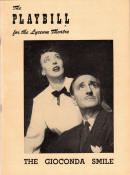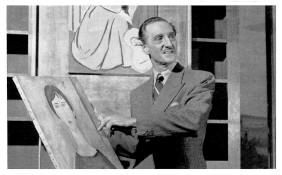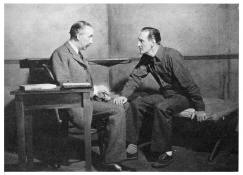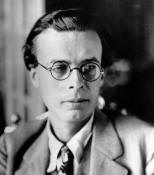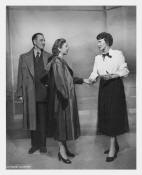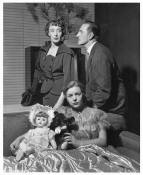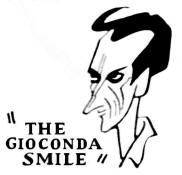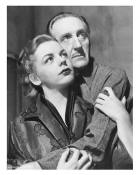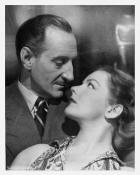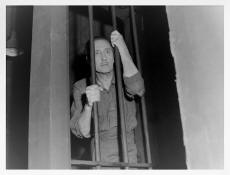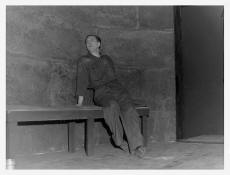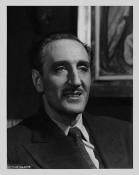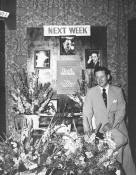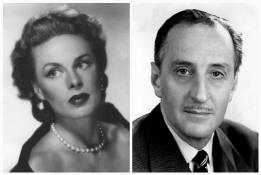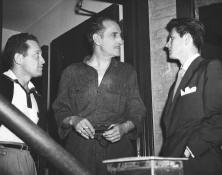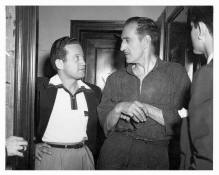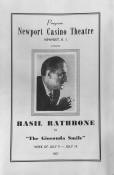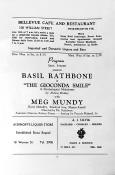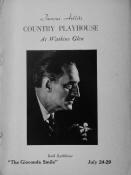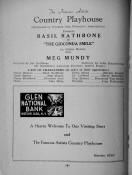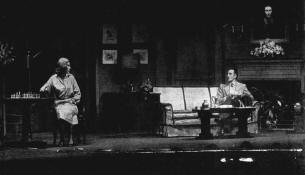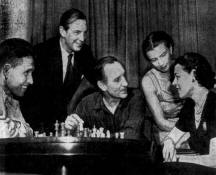|
|
The Gioconda SmileA play in three acts by Aldoux Huxley. Opened at the Lyceum Theater, New York City, October 7, 1950. The play closed on November 11, after 41 performances. Produced and staged by Shepard Traube. General manager, Walter Fried; stage manager, Bill Ross; assistant stage manager, Bob Myerson; set design, Feder; master carpenter, Joseph Willoughby; master electrician, William Noon, assistant electrician, Eugene Bolton; property master, Jack Shapiro; Scenery, Charles Rakeman Studio. Cast of characters
The story of The Gioconda Smile centers around Henry Hutton—a gentleman of wealth and charm. For years Hutton has been married to an invalid wife and is apparently loyal to her. And for years he has been a neighbor and friend to Janet Spence, a woman in her forties who secretly adores him and hopes to marry him when his wife dies. Yet, shortly after Mrs. Hutton's death, Janet learns to her dismay that Hutton has married a 21-year-old girl. Hutton's unexplainable act generates shock, jealousy and anger. An investigation reveals that the first Mrs. Hutton was poisoned. All the evidence points to Hutton; he is convicted and sentenced to hang. Convinced of Hutton's innocence, Dr. Libbard manages to get a confession from Janet — just in time to save Hutton from the gallows. The title alludes to the enigmatic smile of Leonardo da Vinci's famous painting "Mona Lisa del Gioconda."
The Gioconda Smile was originally written as a short story in 1922. (In that short story, Janet's confession is made after Hutton's execution. Yikes. The adage "Hell hath no fury like a woman scorned" is very true in this story!) Author Aldous Huxley adapted the story for a film in 1947, and subsequently reworked it for the stage in 1948. The play was produced successfully in both London and Paris. In England the play ran for 63 weeks. Based on the success of the play not only in Europe, but also in South America and Australia, the decision was made to bring it to Broadway. Basil Rathbone signed the contract to star in The Gioconda Smile in April 1950. With a planned opening of October 3, rehearsals started September 1. Just before rehearsals began, Rathbone managed to break his ankle. Newspaper reports didn't specify how this happened, only that it was an accident, and he was limping. In spite of his injury, Rathbone went through rehearsals and the previews held the week before the scheduled opening date. His physician advised him to rest the ankle for a few days before attempting to continue in the role. The opening was therefore delayed until Saturday, October 7, 1950. He went on at a theatre party preview of the play Friday evening. The cast for The Gioconda Smile included Marian Russell (making her debut on the Broadway stage) as Doris, George Relph (well known on the London stage) as Dr. Libbard, and his wife Mercia Swinburne as Nurse Braddock. General Spence was portrayed by Charles Francis, who, like Basil Rathbone, began his acting career with Frank Benson's Shakespearean Company. British actress Valerie Taylor was brought over from England to play the part of Janet Spence. She had played the same role in the London production of the play opposite Clive Brook. After conversing with Miss Taylor about the role, author Aldous Huxley wrote to Basil Rathbone, and relayed Miss Taylor's suggestions. Here is Huxley's letter:
The Gioconda Smile played at the Lyceum Theatre from October 7 through November 4, 1950. Another play, The Country Girl, was due to open at the Lyceum on November 7, so The Gioconda Smile would need to close or find a new venue. The play transferred to The Fulton Theatre on November 6, and planned to play there until November 24, when it would need to vacate The Fulton for another play (The Golden State) that was due to open there on November 25. According to The New York Times (October 28, 1950), Producer Shepard Traube was promised another theatre for The Gioconda Smile following the engagement at the Fulton. The NY Times reported, "What has prompted the producer to keep the show going is the active interest at the box office and the steady call from the ticket brokers. The offering averaged more than $17,000 for its first and second weeks, with theatre parties, and the weekly intake is expected to be greater this week without the benefit of theatre parties. The prospects for a long run are such that Valerie Taylor, the British actress who co-stars in the play with Basil Rathbone, asked her husband, Desbrough W. Saunders to come to this country." Unfortunately, the box office receipts did not materialize as expected; the play closed on November 11. Reviews were mixed. Time magazine (October 16, 1950) was not a fan of the play: "The Gioconda Smile offered mournful proof of what the stage can do to harm a piece of writing and of how time can accentuate a writer's faults. . . . The play hardly purports to be a mystery; but in return it insists on being just about everything else, psychological and emotional, cultural and philosophic. ... The result, though sometimes good talk and sometimes good purple theater, is a kind of botch. . . . And the production—with Basil Rathbone hamming as the husband and Valerie Taylor brilliantly overacting as the woman scorned—adds thumping the pedal to banging the keys." Brooks Atkinson of The New York Times (October 15, 1950) praised the acting, but criticized the writing: "Theatrical dialogue, as contrasted with dialogue and general observations in novels, acquires its vitality from the theme and structure of the play. No matter what it says, it does not come to life unless it carries forward the interior movement of the story. This is not an academic law. It is implicit in the form of drama, which is closer to music than it is to prose fiction. Although Mr. Huxley has an interesting melodramatic story to tell in The Gioconda Smile, he handles it more like a general writer than a dramatist, and it leaves an impression of mixed styles and heaviness on the stage. If the play were simpler it would have more impetus and cohesion. It is acted very well indeed by Basil Rathbone, as the accidental victim in a monstrous situation, and by George Relph, as the physician. Miss Taylor is giving a performance of the first rank. It is a searching study of character and an overwhelming expression of thwarted and frustrated emotion." Wolcott Gibbs of The New Yorker (October 14, 1950) also criticized the writing: "Mr. Huxley has a tricky little melodrama which, regardless of its fate at the Lyceum, can hardly fail to be embarrassing to him as a writer of subtle and unique talent. The performers in The Gioconda Smile are, I should say, under a strange handicap. In theory, that is, their play is a highly sophisticated drama, but really it is almost as elementary as The Black Crook. This undoubtedly leads to a certain confusion in the mind and to the lid of acting that occasionally suggests a parody of Hamlet. Basil Rathbone probably suffers most seriously from this necessity of giving an air of importance to practically nothing, but Valerie Taylor, George Relph, and Marian Russell know their spells of unhappiness, too. The producer and director, Shepard Traube, has engineered a production for which 'florid' is the only word that occurs to me at the moment." John Chapman of The New York Daily News, however, praised the play as well as the acting:
"The Gioconda Smile suffers from untidiness and lack of emphasis. Huxley is more concerned with psychology than melodrama, even more with ethics than psychology, but he has been unable to blend the three elements into dramatic action. Time and again the progress of scenes is parenthetically interrupted by lengthy intellectual dialogues which contain interesting ideas. ... The direction is surface and seems to have no meaning beyond providing the actors with movement from chair to desk to door. Basil Rathbone's accent has grown more British, more clipped with each passing year. He is now well-nigh unintelligible. Valerie Taylor cam from England especially to portray Janet Spence. There are at least a dozen actresses here who could have done it as badly. Marian Russell's performance is a veritable pyramid of clichés in characterization. George Relph, as the doctor, is the only member of the cast who seem to understand his role and the author's intention." —Theatre Arts, December 1950 "The Gioconda Smile keeps you breathless ... tremendous impact ... full-blown drama. ... The kind of play I deeply enjoy. ... Basil Rathbone gives a memorably wise and tempered performance." —Hawkins, New York World-Telegram and The Sun
"For all its garrulousness and awkward dramaturgy, The Gioconda Smile deals with characters and a progressive situation that commands interest and it finally does uncork a stunning punch. It is also given reality and essential vitality by the playing of its gifted cast. As the suspected murderer, Basil Rathbone gives a skillfully shaded and paced performance. Valerie Taylor, brought from England for the assignment, presents a superbly harrowing portrayal of the unwanted woman whose intense ardor leads to murder and ultimately to guilt-induced hysteria. George Relph gives a supple and ingratiating performance as the perceptive physician, despite the gabbiness of the part. Marian Russell is properly disarming as the painter's young second wife, Mercia Swinburne is plausible as a suspicious, man-hating nurse, and Charles Francis is believable as the rebelliously invalid father of the murderess." —Variety, Oct. 11, 1950 "The Gioconda Smile has been acclaimed here as one of the most exciting and unusual productions of the new season." —The Westbury Times, November 2, 1950
Basil Rathbone again played the role of Henry Hutton in Summer Stock in July and August of 1951. Meg Mundy played the role of Janet Spence. Marian Russell, who played Doris Mead on Broadway, reprised her role for the summer productions. Not only did Basil Rathbone act in The Gioconda Smile, he also directed the play. Rosalind Ivan (Nurse Braddock) and Harry Mehaffey (Dr. Libbard) were in all or most of the performances. The actors who played smaller roles varied from one location to the next. The dates and locations of the 1951 Summer Stock performances of The Gioconda Smile are as follows:
Because the Broadway production of The Gioconda Smile was not an unqualified success, Basil Rathbone's wife, Ouida Bergere, took it upon herself to "improve" the script. Reportedly, she collaborated with Aldous Huxley on the adaptation. The revised version of the play offered more drama and less philosophical talk. The Scranton Times Tribune (July 23, 1951) reported, "The Gioconda Smile, starring Basil Rathbone, has a very effective final sequence showing Basil being saved from the hangman's noose at the very last moment. That scene wasn't in Aldous Huxley's original version—it was written and added by Basil's admiring wife, Ouida, who thought it was only fitting that the final curtain should fall on Basil rather than one of the less important players." The New York Daily News (July 8, 1951) reported that the Rathbones furnished several valuable paintings from their own home for the play setting during the Summer tour. Basil Rathbone's 12-year-old daughter, Cynthia, accompanied her father on his Summer Stock tour. She had a job with the show as an errand girl and assistant dresser for members of the cast. On average, Basil Rathbone earned $2500 each week during Summer Stock. Reviews from the performances in Princeton, New Jersey, and Newport, Rhode Island: "Basil Rathbone's portrayal of the country gentleman, guilty of neglect and evasion but not of cruelty, was as finished as was to have been expected, although many of his lines failed to get across the footlights. Whether the fault lies with Rathbone, the theater or the fans could not be determined. Meg Mundy gave an excellent performance. The difficult and melodramatic role of the treacherous murderer calls for a show of strong emotional acting and those things seem to be second nature to Miss Mundy." —The Central New Jersey Home News, July 3, 1951 "A touch of philosophical import lifts the play out of the standard mystery category. ... Basil Rathbone is polished and sure, and gives color to a tedious part. Meg Mundy takes advantage of the drama's juiciest role with sympathy and vitality. By her convincing portrayal of humiliation and revenge she becomes the center of the action and conflict." —Newport Daily News, July 10, 1951
Reviews from the performances in Olney, Maryland: "Expect to be annoyed, excited and bored in quick turns as the play progresses. ... Apart from the foibles of Huxley, any laurels left for the play go to the performers. The cast is as sturdy a group of actors as have been around all summer at Olney. Mr. Rathbone, it appeared on opening night, fared better with the audience than many of his lines. Meg Mundy was outstanding." —Alex Bilanow, The Washington Daily News, August 16, 1951 "A more frequent visitor in this vicinity than most, Rathbone is well liked, and his admirers are being given a change to observe his expert, suave handling of a role which has many inconsistencies. ... The production and acting as a whole are very good by summer theater standards." —Donald Kirkley, The Baltimore Sun, August 16, 1951 "The Gioconda Smile is a good story. Trouble is, there are an awful lot of Huxley's ideas in it which, aside from being fuzzy, are not particularly well-adapted to the stage. ... The action in The Gioconda Smile is being constantly interrupted by Huxley. Rathbone is indicted for murder—and everybody settles down for a discussion on love. Not just plain everyday love, but the cosmic kind. He's waiting in the death house to be hanged—Huxley bombards him, and the audience, with a sermon on the importance of accepting reality. ... Speaking for myself, I think I'd be a lot less irritated if Rathbone had edited the play with less respect for Huxley. The performances are all top-drawer. Rathbone has never given us a bad show and The Gioconda Smile, with all its flaws, keeps his record intact." —Ernie Schier, The Times-Herald (Washington DC), August 16, 1951 "A serious absorbing drama with touches of humor, The Gioconda Smile, by Aldous Huxley, is offered at Ogunquit this week. ... Despite Rathbone's spirited entrance and vigorous first act performance, the play got off to a very slow start Tuesday evening, making it that much harder to get audience response to the increasingly intense action. ... It seemed that neither Miss Mundy nor Mr. Rathbone were at their best, evidencing certain inconsistencies, but the roles were sufficiently well developed to carry the play to a successful close." —Alicia M. Panages, Evening Express (Portland, Maine), August 29, 1951 . |
||||||||||||||||||||||||||||||||||||||||||||||||||||||||||||||||||







